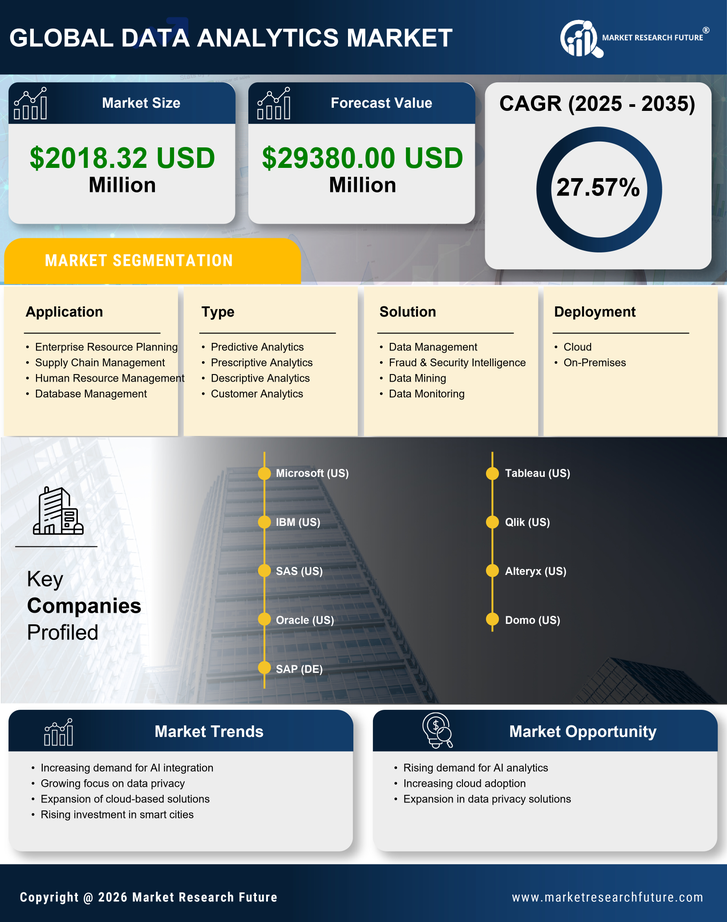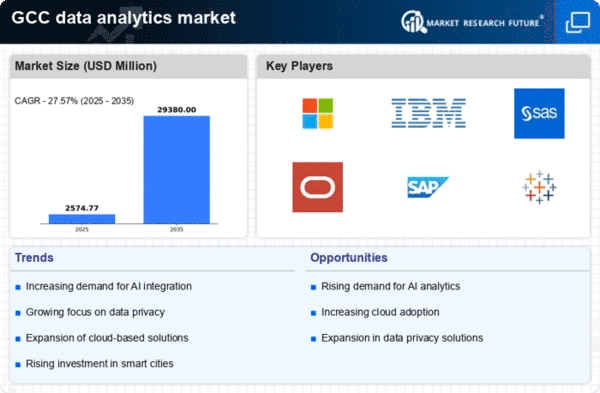Rising Importance of Data Security
As the data analytics market expands, the importance of data security is becoming increasingly pronounced. Organizations in the GCC are recognizing the need to protect sensitive information while leveraging analytics for business insights. This concern is driving investments in data security measures, including encryption and access controls, to safeguard data integrity. According to industry reports, spending on data security solutions is expected to grow by 30% annually, reflecting the critical nature of this issue. Companies are also focusing on compliance with regulations to avoid potential penalties. Consequently, the data analytics market is adapting to these security demands, leading to the development of more secure analytics platforms that prioritize data protection.
Integration of Advanced Technologies
The integration of advanced technologies such as artificial intelligence (AI) and machine learning (ML) is significantly influencing the data analytics market. In the GCC, organizations are increasingly leveraging these technologies to enhance their analytical capabilities. AI and ML enable businesses to process vast amounts of data more efficiently, uncovering patterns and insights that were previously unattainable. This technological advancement is expected to drive the market's growth, with AI-driven analytics projected to account for over 40% of the total analytics market by 2027. As companies continue to adopt these technologies, the data analytics market is likely to evolve, offering more sophisticated solutions that cater to diverse business needs.
Growing Demand for Real-Time Analytics
The data analytics market is experiencing a notable surge in demand for real-time analytics solutions. Organizations across various sectors in the GCC are increasingly recognizing the value of immediate insights derived from data. This trend is driven by the need for timely decision-making, particularly in industries such as finance and retail, where market conditions can change rapidly. According to recent estimates, the real-time analytics segment is projected to grow at a CAGR of approximately 25% over the next five years. This growth reflects a broader shift towards data-driven strategies, as businesses seek to leverage analytics for competitive advantage. Consequently, the data analytics market is likely to expand significantly as companies invest in technologies that facilitate real-time data processing and analysis.
Expansion of Data-Driven Decision Making
The data analytics market is witnessing a paradigm shift towards data-driven decision making among organizations in the GCC. Companies are increasingly adopting analytics tools to enhance operational efficiency and improve strategic planning. This trend is supported by the growing recognition that data can provide valuable insights into customer behavior, market trends, and operational performance. As a result, businesses are investing heavily in analytics capabilities, with expenditures expected to reach $2 billion by 2026. This investment is indicative of a broader cultural change within organizations, where data is becoming central to decision-making processes. The data analytics market is thus positioned for robust growth as more companies embrace this data-centric approach.
Emergence of Industry-Specific Analytics Solutions
The data analytics market is witnessing the emergence of industry-specific analytics solutions tailored to meet the unique needs of various sectors in the GCC. Industries such as healthcare, finance, and retail are increasingly seeking customized analytics tools that address their specific challenges and requirements. This trend is driven by the recognition that generic solutions may not adequately capture the nuances of different industries. As a result, vendors are developing specialized analytics platforms that offer targeted insights and functionalities. This shift is expected to enhance the overall effectiveness of analytics initiatives, with industry-specific solutions projected to capture a significant share of the market by 2028. The data analytics market is thus evolving to provide more relevant and impactful solutions for diverse sectors.

















